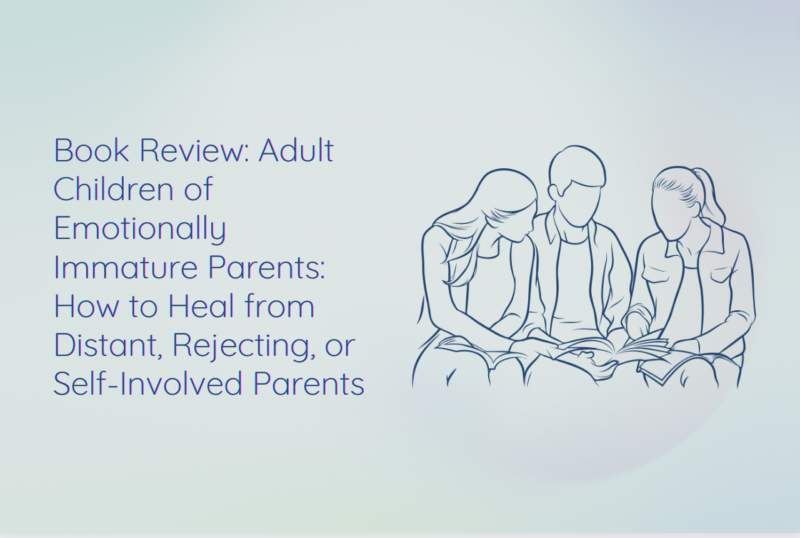Book Review: Adult Children of Emotionally Immature Parents: How to Heal from Distant, Rejecting, or Self-Involved Parents By Lindsay C. Gibson, PsyD
Roamers Therapy | June 2023
Adult Children of Emotionally Immature Parents highlights different characteristics of emotionally immature parents, how children raised by these parents are influenced in adulthood by their experiences, and methods of coping with parents who are emotionally neglectful.
Gibson points out four types of emotionally immature parents: emotional, driven, passive, and rejecting. Emotional parents tend to be reactive and unpredictable, leading children to hyperfocus on pleasing the parents based on their mood. Driven parents have a tunnel vision to success and often push their children to work hard without providing emotional support. Passive parents are present for their children in many ways but are not available emotionally. Rejecting parents are not open to emotional intimacy and can seem to have a wall around them.
As adults, children of emotionally immature parents tend to exhibit characteristics of an externalizer or internalizer. Gibson describes externalizers as people that are reactive and depend on external soothing while internalizers tend to be people-pleasers and overly sacrifice for others. Understanding your own relationship to emotional intimacy during childhood is important to recognizing these behaviors and unlearning unhealthy habits.
Gibson acknowledges that healing from parents’ emotional immaturity can be difficult if it is something you are still facing as an adult interacting with parents. She notes recognition of the desire for parents to change and acceptance that this desire may not come to fruition as foundational to healing. Awareness allows you to stop yourself from becoming reeled into the desire for your parents to change when you notice it becoming present. Acceptance allows you to move forward despite your parent’s emotional immaturity.
Once awareness and acceptance are present, Gibson notes the maturity awareness approach as a three-step tool for effectively interacting with emotionally immature parents. The first step in this approach is to express your needs or feelings and let go of any desire for your parent to be receptive to what was shared. The second step is to focus on the realistic outcomes regarding yourself rather than goals involving change from your parent. Thirdly, attention should be directed towards managing interactions rather than engaging with emotionally immature responses.
Adult Children of Emotionally Immature Parents offers a starting point from which to gain a better understanding of parents’ emotionally neglectful behaviors and how these behaviors affect children into adulthood. Though you may not be able to change your parent’s behavior, you do have control over your own healing journey. First, it is important to connect with your inner child. Once you differentiate between your inner child’s desires and your current needs, you can reflect on what boundaries are being crossed in interactions with your parents. From here, the maturity awareness approach can be employed to help set boundaries and resist engaging with emotionally immature responses. It can be helpful to engage in this process through therapy where a professional can guide you in processing surfacing emotions. As a child, the idea of setting boundaries may not have crossed your mind but as an adult, you can take action to limit interactions that take a negative toll on you.
At Roamers Therapy, our psychotherapists are here to support you through anxiety, depression, trauma and relationship issues, race-ethnicity issues, LGBTQIA+ issues, ADHD, Autism, or any challenges you encounter. Our psychotherapists are trained in Cognitive Behavioral Therapy, Dialectical Behavioral Therapy, Psychodynamic Therapy, Acceptance, and Commitment Therapy, Person-Centered Therapy, and Gottman Therapy.
Whether you’re seeking guidance on a specific issue or need help navigating difficult emotions, we’re ready to assist you every step of the way.
Contact us today to learn more about our services and schedule a session with our mental health professionals to begin your healing journey. To get started with therapy, visit our booking page.
First, decide if you’ll be paying out-of-pocket or using insurance. If you’re a self-pay client, you can book directly through the “Book Now” page or fill out the “Self-Pay/Out-of-network Inquiry Form.” If you’re using insurance, fill out the “Insurance Verification Form” to receive details about your costs and availability. Please let us know your preferred therapist. If your preferred therapist isn’t available, you can join the waitlist by emailing us. Once your appointment is confirmed, you’ll receive intake documents to complete before your first session.
This page is also part of the Roamers Therapy Glossary; a collection of mental-health related definitions that are written by our therapists.
While our offices are currently located at the South Loop neighborhood of Downtown Chicago, Illinois, we also welcome and serve clients for online therapy from anywhere in Illinois and Washington, D.C. Clients from the Chicagoland area may choose in-office or online therapy and usually commute from surrounding areas such as River North, West Loop, Gold Coast, Old Town, Lincoln Park, Lake View, Rogers Park, Logan Square, Pilsen, Bridgeport, Little Village, Bronzeville, South Shore, Hyde Park, Back of the Yards, Wicker Park, Bucktown and many more. You can visit our contact page to access detailed information on our office location.

